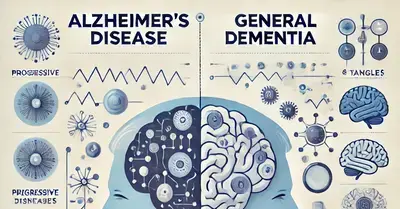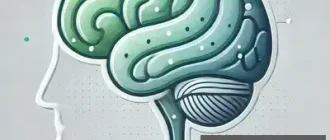Alzheimer’s disease and dementia are terms often used interchangeably, but they have distinct meanings. Understanding the difference is crucial for accurate diagnosis, treatment, and care.
Dementia is an umbrella term used to describe a decline in cognitive function severe enough to interfere with daily life. It includes symptoms like memory loss, confusion, and difficulty with thinking or decision-making. Dementia is caused by various underlying conditions, of which Alzheimer’s disease is the most common.
Alzheimer’s disease is a specific type of dementia. It is a progressive, degenerative brain disorder that primarily affects memory, thinking, and behavior. While all individuals with Alzheimer’s have dementia, not all individuals with dementia have Alzheimer’s.
Key Differences
| Feature | Dementia | Alzheimer’s Disease |
|---|---|---|
| Definition | General term for cognitive decline due to various causes. | Specific disease causing progressive cognitive decline. |
| Cause | Can result from multiple conditions, such as vascular issues, Parkinson’s, or infections. | Caused by abnormal protein deposits (amyloid plaques and tau tangles) in the brain. |
| Symptoms | Vary based on the underlying condition. May include memory issues, confusion, language difficulties, and mood changes. | Characterized by memory loss, disorientation, impaired judgment, and changes in behavior. |
| Progression | Depends on the underlying cause; some forms can be stable or even reversible. | Always progressive and irreversible, typically worsening over several years. |
| Treatment Options | Treatable causes can sometimes be reversed (e.g., vitamin deficiency, thyroid problems). | Treatments focus on slowing progression and managing symptoms. |
| Prevalence | Affects approximately 55 million people globally. | Accounts for 60-80% of all dementia cases. |
Symptoms Comparison
Dementia
- Vary widely depending on the cause.
- Can include:
- Forgetfulness.
- Difficulty focusing.
- Language impairment.
- Mood and personality changes.
Alzheimer’s Disease
- Memory loss that disrupts daily life (e.g., forgetting recently learned information).
- Challenges in planning or solving problems.
- Difficulty completing familiar tasks.
- Confusion about time and place.
- Trouble understanding visual images and spatial relationships.
Progression of Symptoms in Alzheimer’s vs. Other Dementias
This horizontal bar chart highlights the progression of key symptoms in Alzheimer’s disease compared to other types of dementia. Alzheimer’s symptoms, such as memory loss and disorientation, show significantly higher progression rates.
Causes and Risk Factors
Dementia
- Stroke or vascular issues.
- Parkinson’s disease.
- Huntington’s disease.
- Infections (e.g., HIV-related dementia).
- Nutritional deficiencies.
Alzheimer’s Disease
- Genetic predisposition (e.g., APOE-ɛ4 gene).
- Age: Most common in individuals over 65.
- Lifestyle factors: Poor cardiovascular health, lack of physical activity.
- Environmental factors: Exposure to toxins.
Causes of Dementia Types
| Dementia Type | Percentage (%) |
|---|---|
| Alzheimer’s Disease | 70% |
| Vascular Dementia | 20% |
| Lewy Body Dementia | 5% |
| Frontotemporal Dementia | 3% |
| Other Causes | 2% |
This chart illustrates the distribution of causes for dementia, with Alzheimer’s disease being the most common, accounting for 70% of cases. Vascular dementia follows at 20%, with smaller percentages attributed to other types.
Diagnostic Approaches
Dementia
- Medical history review and cognitive testing.
- Brain imaging to identify structural abnormalities.
- Blood tests to rule out reversible causes.
Alzheimer’s Disease
- Comprehensive neurological exams.
- Advanced imaging (PET scans to detect amyloid plaques).
- Genetic testing in some cases.
Treatment Strategies
Dementia
- Addressing underlying causes (if treatable).
- Cognitive therapies and lifestyle modifications.
- Medications for symptom management (e.g., antidepressants, antipsychotics).
Alzheimer’s Disease
- Cholinesterase inhibitors (e.g., Donepezil).
- NMDA receptor antagonists (e.g., Memantine).
- Focus on supportive care and quality of life improvements.
Effectiveness of Treatment Options
This horizontal bar chart displays the effectiveness of various treatment options for managing dementia symptoms. Cholinesterase inhibitors show the highest effectiveness, while antidepressants are the least effective among the listed treatments.
Final Thoughts
While Alzheimer’s disease is the most common form of dementia, it is just one of many possible causes. Differentiating between the two can significantly impact treatment and care. Early diagnosis and intervention are crucial for managing symptoms and improving outcomes.
About the Author
Reyus Mammadli is the author of this health blog since 2008. With a background in medical and biotechnical devices, he has over 15 years of experience working with medical literature and expert guidelines from WHO, CDC, Mayo Clinic, and others. His goal is to present clear, accurate health information for everyday readers — not as a substitute for medical advice.







